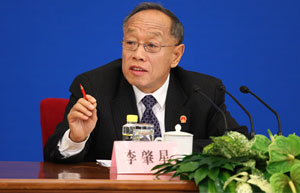Chongqing leads the way in affordable housing
(China Daily)
Updated: 2011-03-10 08:16
Much is said about China's rise and the implications it will have for all of us, but what has had a greater impact on me, as a resident of the Chinese capital, is "Beijing's rise". By that, I mean quite literally rising, with massive tower blocks sprouting up throughout the city where once sprawling villages with tiny, shoddy housing stood.
It is a phenomenon that has changed the lives of many residents. I live in a part of the city, which, 20 years ago, barely even figured on maps of Beijing, but is now an innovative, industrious and international community.
According to Beijing statistics bureau, the per capita disposable income of urbanites in the municipality was 29,073 yuan ($4,431) in 2010.
The average property price in December in Beijing reached 26,599 yuan per square meter, according to figures released by the Beijing municipal commission of housing and urban-rural development.
The housing reform of the late 1990s, which transformed millions of people from occupants to homeowners, gave many people the chance to move up the property ladder, and kick-started the real estate sector.
But the marketization of housing has led to a situation where the construction of smaller, more affordable homes either for sale or rental is quite rare. After all, if there is no requirement on property developers to build these types of homes, why should they? They are in it for the money, so it stands to reason that they will position themselves toward the medium and high-end market.
That's why government should play a greater role in housing. Only through increased regulation of the sector and statutes mandating that developers build a certain proportion of affordable homes for sale or rent can the less well-off in our society be guaranteed a decent place to live.
In terms of efforts to give people a decent home, Chongqing, the giant municipality in Southwest China, is setting a fine example.
Over the next three years, about 40 million sq m of housing will be built, providing accommodation for 2 million people in the city who either currently do not have a home of their own, or live in substandard housing.
Thanks to the program, the first such large public housing scheme in a major Chinese city, one-third of Chongqing's urban population will have public-rented homes, paying rent 40 percent less than the commercial rate for similar properties.
In addition, a major development took place in January, when the central government signed agreements with provincial-level governments to guarantee that they will meet the target of building 10 million government-subsidized homes this year, an increase of 72.4 percent on the figure in 2010.
These projects, which include the construction of 420,900 government-subsidized apartments in Henan province, 400,000 in Yunnan and 158,700 in Gansu, are slated to begin before the end of October.
If the local leaders fail to do this, they face punishments that include demotion and even dismissal.
It is also encouraging to hear from the central government that another 10 million government-subsidized homes will be built next year and a further 16 million from 2013 to the end of 2015.







